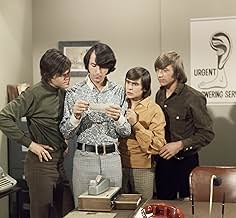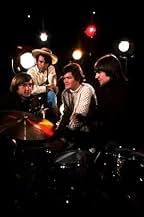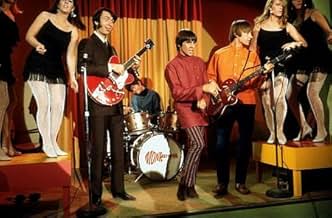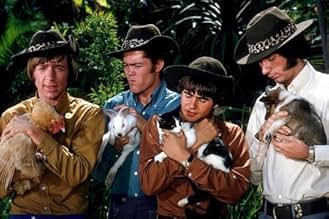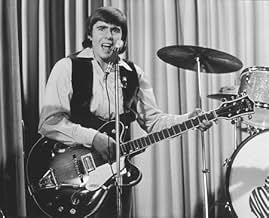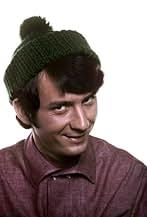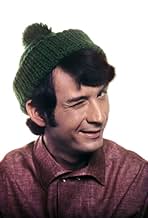IMDb RATING
7.5/10
5.6K
YOUR RATING
The misadventures of a struggling rock group.The misadventures of a struggling rock group.The misadventures of a struggling rock group.
- Won 2 Primetime Emmys
- 3 wins & 2 nominations total
Browse episodes
Featured reviews
The Monkees was one of the most unique television shows ever created! The show featured great music and comedy that had people laughing for hours. All four of the guys were extremely talented and no one else could have taken their place. The show should be run more often so that today's generation of kids can enjoy them too.
The Monkees may have been created as a Beatles-of-America series, but like The Fab Four the show and the group within had a pivotal role in pop music history. While the concept of quick-edit rock music pieces began with A Hard Days Night and its sequels, it was The Monkees that really fleshed out the concept that today is known as the music video.
The power of television proved itself with Monkee-mania, and seeing the series and listening to the records four decades after their debut reveals how fresh and engaging both still are. The sit-com concept was basically parodied, and the free-wheeling styles of Micky Dolenz, Michael Nesmith, Peter Tork, and David Jones made the parodies all the more cutting and funny. There is a magnetism to Micky, Mike, Peter, and Davy that still shows in the show and the music; the use of session hipsters in the backing tracks certainly created a strong baseline at the beginning, but in concert with session help or all on their own (in the album Headquarters and the songs from which the show made use), it was Micky, Mike, Peter, and Davy who gave the music a stamp that was undeniably theirs.
The same is true of the show - other singers have shown engaging humor (Alison Krauss is one of the funniest), but none show the magnetic zaniness of The Monkees (if anything, Ms. Krauss' sense of humor is more like Mike Nesmith's than anything).
This is why the show and the group will always endure.
The power of television proved itself with Monkee-mania, and seeing the series and listening to the records four decades after their debut reveals how fresh and engaging both still are. The sit-com concept was basically parodied, and the free-wheeling styles of Micky Dolenz, Michael Nesmith, Peter Tork, and David Jones made the parodies all the more cutting and funny. There is a magnetism to Micky, Mike, Peter, and Davy that still shows in the show and the music; the use of session hipsters in the backing tracks certainly created a strong baseline at the beginning, but in concert with session help or all on their own (in the album Headquarters and the songs from which the show made use), it was Micky, Mike, Peter, and Davy who gave the music a stamp that was undeniably theirs.
The same is true of the show - other singers have shown engaging humor (Alison Krauss is one of the funniest), but none show the magnetic zaniness of The Monkees (if anything, Ms. Krauss' sense of humor is more like Mike Nesmith's than anything).
This is why the show and the group will always endure.
I have enjoyed watching this show for years since I first saw it in syndication on local television back in the late 1970s. From the first time I watched The Monkees I was hooked and have watched the show ever since. Whenever it would be shown over the years I was there to watch it, including the revival in popularity that arose in 1986 when MTV ran a Monkees marathon that exposed their antics to a new generation of fans. The show had a great zaniness that blended a unique mixture of music and comedy, which made the show a delight for me. As a kid I enjoyed the entertaining plots and thought it would be cool to hang around with these 4 guys. I did, though, always look forward to the musical numbers that occurred in each episode.
The music on the show was what really appealed to me and made me a fan in the beginning. Their albums from the 60s still make up part of my music collection. The show was never that popular when it was originally airing on commercial television, but the music really helped push the popularity of the band giving The Monkees a cult-like status similar to The Beatles at the time. I especially like the music of Michael Nesmith. The songs that appeared in the show by Nez were most appealing to me and this carried over to his solo career as well. Another thing that was a great part of the show was the comic timing of Mickey Dolenz. He always cracks me up with his wacky style of voices and improvisation. All four were talented in their own way, but Mickey Dolenz was the funniest to me.
It is still one of my all time favorite shows and has left a lasting impression on me that will stay with me my whole life. One of the more memorable shows was the parody of Faust called The Devil and Peter Tork. It had some seriousness, but that helped the comedy to play. Some episodes played out better than others with the second season being a little more reflective of the 60s culture that was growing popular during that period in America.
Was it a TV show? Was it a rock n' roll group? It was neither, and it was a little of both. Mickey Dolenz equated their becoming a group to Leonard Nimoy becoming a Vulcan. No matter what you believe, we can all agree that The Monkees, although brief in its original run, was about a group that did play, that did perform their own music and the way they did it left an impact on generations both young and old and will do so for years to come.
The music on the show was what really appealed to me and made me a fan in the beginning. Their albums from the 60s still make up part of my music collection. The show was never that popular when it was originally airing on commercial television, but the music really helped push the popularity of the band giving The Monkees a cult-like status similar to The Beatles at the time. I especially like the music of Michael Nesmith. The songs that appeared in the show by Nez were most appealing to me and this carried over to his solo career as well. Another thing that was a great part of the show was the comic timing of Mickey Dolenz. He always cracks me up with his wacky style of voices and improvisation. All four were talented in their own way, but Mickey Dolenz was the funniest to me.
It is still one of my all time favorite shows and has left a lasting impression on me that will stay with me my whole life. One of the more memorable shows was the parody of Faust called The Devil and Peter Tork. It had some seriousness, but that helped the comedy to play. Some episodes played out better than others with the second season being a little more reflective of the 60s culture that was growing popular during that period in America.
Was it a TV show? Was it a rock n' roll group? It was neither, and it was a little of both. Mickey Dolenz equated their becoming a group to Leonard Nimoy becoming a Vulcan. No matter what you believe, we can all agree that The Monkees, although brief in its original run, was about a group that did play, that did perform their own music and the way they did it left an impact on generations both young and old and will do so for years to come.
I was 9 or 10 years old when The Monkees debuted on NBC. I have been a fan ever since. I even saw them in concert during the summer of 1967. I was very peeved at not being able to hear them due to the screaming girls. I thought girls must be the dumbest creatures on earth, but of course I changed my feelings before long. They were still dumb as far as I could tell, but they were cute, too. I saw the Monkees again when three of them (minus Nesmith) reunited in the mid-eighties and late nineties. The Monkees have been unfairly ostracized for decades. "They don't play their own instruments", their critics complained. They were not allowed to play on their first two albums. Don Kirshner, their egomaniacal producer, wanted total control. This ultimately got him fired by the band. He released More of The Monkees without permission from the band. If that weren't bad enough, the album's liner notes were pure Kirshner. Kirshner's egomania is all too apparent. He shamelessly name drops and barely mentions The Monkees at all. Michael Nesmith put his fist through a wall when the band met with Kirshner later. According to Micky Dolenz, Nez snarled, "That coulda been your face, motherf-----!" In any event, that was it for Kirshner as far as The Monkees were concerned. They finally had creative control of the music. For their third album, The Monkees Headquarters, they played on every song with minimal outside accompaniment. They credited the extra 2 or 3 musicians in the liner notes, something other bands (Beatles included) were not so forthcoming about. Micky Dolenz has never gotten the credit he deserves as a great rock vocalist. Just listen to No Time, Randy Scouse Git, Going' Down, Words, Pleasant Valley Sunday, etc. Each Monkey had talent. Micky had a great voice, Mike Nesmith was a good singer and musician, Peter Tork played about a dozen instruments, and Davy Jones was a superb showman and a pretty good singer. About 20 years ago, there was talk of a Monkees TV special. Davy was explaining how it would be set up. "Mike would produce, Micky would direct, and Peter would be in charge of the music." "But what would you do?" Davy was asked. "I would be the star, of course, and get all the girls!" When I see some of the acts who have been inducted into the Rock and Roll Hall of Fame (the Sex Pistols?!) there is no doubt The Monkees deserve to be enshrined. They certainly are more deserving than many who are already in.
In 1963, producer Bob Rafelson came up with the idea while vacationing on tour with a band in Mexico for a television series about the adventures of a musical act. The exception of this idea was hard to come by,but by 1964 all of that changed with the music of the British invasion. "The Beatles" was all the rage and it changed the course of the American pop scene very quickly. Developing the idea for this series would be hard to come by not to mention a hard sell. Teaming up with the executive producer Bert Schneider at Screen Gems-Columbia Pictures,work was set out to develop the concept of the show which was loosely based on "The Beatles". Bob Rafelson and Bert Schneider under there production company Raybert Productions with a script that was written by Paul Mazursky and Larry Tucker sold the series idea to the head of Screen Gems in August of 1965 with a pilot script called "The Monkeys". The idea for a television series about a fictional rock and roll group was developed as early as 1960,but had a hard time interesting anyone until 1965,by which time rock and roll music and the phenomenal success of "The Beatles" two movies "A Hard Days Night" (1964),and "Help!"(1965), was entrenched in pop culture with the British invasion of music scene sweeping the country. In September of 1965, trade publication newspapers ran and ad seeking "Folk and Roll Musicians-Singers for acting roles in a new television series". As many as 400 hopefuls showed up to be considered as one of "4 insane boys". Fourteen actors from the audition pool were brought back for screen tests and after audience research, Raybert Productions chose their final four.
The final four that were selected for this series were Mickey Dolenz(who had prior screen experience),Davy Jones, Michael Nesmith,and Peter Tork. The overall part of the show followed the adventures of a folk-rock band forever on the verge of stardom in which these four talented musicians lived together in a crazy apartment and were frequently drawn into the lives of California's many eccentrics. These adventures in which the boys were involved with were interrupted by songs(the songs were written by the best songwriters in the business consisting of Neil Diamond, Harry Nilsson, Carole King, and Boyce & Hart among others). As for the development of the series producers Rafelson and Schneider wanted the style of the series to reflect avant-grade techniques such as improvisation, quick cuts, jump cuts, breaking the fourth wall, and free-flowing loose narratives which was new to audiences at the time this television series premiered which included new techniques in editing and production.
Created by Bob Rafelson and Bert Schneider(who also served as executive producers of the series),and produced by Ward Sylvester(Season 2 only), the television series "The Monkees" premiered on NBC's Monday night schedule in prime-time on September 12,1966 at the 7:30pm eastern/6:30pm central time slot in color and was produced Screen Gems/Raybert Productions. The show's sponsors throughout it's run were Kellogg's of Battle Creek(Kellogg's Cereals),and Yardley Fashions of London. Season 1 of the series aired on Monday nights preceding "I Dream of Jeannie" and opposite "The Iron Horse" and "Gilligan's Island" for 32 episodes in color airing from September 12,1966 until April 24,1967. Season 2 of the series also aired on Monday nights preceding "The Man From UNCLE", "Rowan and Martin's Laugh- In",and "The Danny Thomas Show" and opposite "Gunsmoke" and "Cowboy In Africa" for 25 episodes in color airing from September 11, 1967 until March 25,1968. A total of 58 color episodes were produced from September 12,1966 until March 25,1968 with repeated episodes airing from April 5,1968 until September 1, 1968. Only Mickey Dolenz, Peter Tork, Davy Jones and Michael Nesmith were the only original cast members that stayed with the series throughout it's entire two year prime time run on NBC.
Director James Frawley directed 28 episodes of the series including it's original pilot episode. Other directors for this series included Bob Rafelson, Alexander Singer, James Komack, Bruce Kessler, Russ Mayberry, David Winters not to mention even Mickey Dolenz and Peter Tork directed various episodes of the series. The writers included the team of Dee Caruso and Gerald Gardner(21 episodes), Stanley Z. Cherry, Bob Rafelson, Paul Mazursky, Bernie Orenstein, Mickey Dolenz, Stanley Ralph Ross, Larry Tucker, Elias Davis,and Neil Burstyn among others.
The guest stars that appeared on "The Monkees" were Bobby Sherman, Melody Patterson, Julie Newmar, Rose Marie, Peter Whitney, Lon Chaney, Jr., Arch Johnson, Vic Tayback, Heather North, Jeanne Arnold, Barton MacLane, Ben Wright, Stan Freberg, Harvey Lembeck, Henry Corden, Chips Rafferty, John Hoyt, Frank Zappa and a cameo appearance by Milton Berle. The best episodes from "The Monkees" were "The Devil and Peter Tork", "Monkey Versus Machine", "Dance, Monkey, Dance", "Your Friendly Neighborhood Kidnappers", "The Monkees Paw", "The Christmas Show","The Monkees On Tour"(which was a documentary style episode),"Monkees Manhattan Style", "I've Got A Little Song Here" among others. "The Monkees" won two Prime Time Emmy Awards in 1967 for Outstanding Comedy Series and Outstanding Directorial Achievement in Comedy(James Frawley). After NBC canceled the series in the Spring of 1968 enjoyed a resurgence on Saturday morning television in repeated episodes. First it aired on CBS' Saturday morning schedule from September 13,1969 until September 2,1972. Then went over to ABC's Saturday morning schedule in repeats from September 9,1972 until August 8,1973. After it's run on network television the 58 original episodes aired in local syndication from 1975 until 1981. The cable music channel MTV brought back all 58 episodes in repeats on February 23,1986. The success of the original series rebooted a new version titled "The New Monkees" that premiered on MTV in 1987 and later in national syndication. Even after more than 50 years..."The Monkees" are still rock and rolling thanks to a new audience and a new generation who are hooked.
The final four that were selected for this series were Mickey Dolenz(who had prior screen experience),Davy Jones, Michael Nesmith,and Peter Tork. The overall part of the show followed the adventures of a folk-rock band forever on the verge of stardom in which these four talented musicians lived together in a crazy apartment and were frequently drawn into the lives of California's many eccentrics. These adventures in which the boys were involved with were interrupted by songs(the songs were written by the best songwriters in the business consisting of Neil Diamond, Harry Nilsson, Carole King, and Boyce & Hart among others). As for the development of the series producers Rafelson and Schneider wanted the style of the series to reflect avant-grade techniques such as improvisation, quick cuts, jump cuts, breaking the fourth wall, and free-flowing loose narratives which was new to audiences at the time this television series premiered which included new techniques in editing and production.
Created by Bob Rafelson and Bert Schneider(who also served as executive producers of the series),and produced by Ward Sylvester(Season 2 only), the television series "The Monkees" premiered on NBC's Monday night schedule in prime-time on September 12,1966 at the 7:30pm eastern/6:30pm central time slot in color and was produced Screen Gems/Raybert Productions. The show's sponsors throughout it's run were Kellogg's of Battle Creek(Kellogg's Cereals),and Yardley Fashions of London. Season 1 of the series aired on Monday nights preceding "I Dream of Jeannie" and opposite "The Iron Horse" and "Gilligan's Island" for 32 episodes in color airing from September 12,1966 until April 24,1967. Season 2 of the series also aired on Monday nights preceding "The Man From UNCLE", "Rowan and Martin's Laugh- In",and "The Danny Thomas Show" and opposite "Gunsmoke" and "Cowboy In Africa" for 25 episodes in color airing from September 11, 1967 until March 25,1968. A total of 58 color episodes were produced from September 12,1966 until March 25,1968 with repeated episodes airing from April 5,1968 until September 1, 1968. Only Mickey Dolenz, Peter Tork, Davy Jones and Michael Nesmith were the only original cast members that stayed with the series throughout it's entire two year prime time run on NBC.
Director James Frawley directed 28 episodes of the series including it's original pilot episode. Other directors for this series included Bob Rafelson, Alexander Singer, James Komack, Bruce Kessler, Russ Mayberry, David Winters not to mention even Mickey Dolenz and Peter Tork directed various episodes of the series. The writers included the team of Dee Caruso and Gerald Gardner(21 episodes), Stanley Z. Cherry, Bob Rafelson, Paul Mazursky, Bernie Orenstein, Mickey Dolenz, Stanley Ralph Ross, Larry Tucker, Elias Davis,and Neil Burstyn among others.
The guest stars that appeared on "The Monkees" were Bobby Sherman, Melody Patterson, Julie Newmar, Rose Marie, Peter Whitney, Lon Chaney, Jr., Arch Johnson, Vic Tayback, Heather North, Jeanne Arnold, Barton MacLane, Ben Wright, Stan Freberg, Harvey Lembeck, Henry Corden, Chips Rafferty, John Hoyt, Frank Zappa and a cameo appearance by Milton Berle. The best episodes from "The Monkees" were "The Devil and Peter Tork", "Monkey Versus Machine", "Dance, Monkey, Dance", "Your Friendly Neighborhood Kidnappers", "The Monkees Paw", "The Christmas Show","The Monkees On Tour"(which was a documentary style episode),"Monkees Manhattan Style", "I've Got A Little Song Here" among others. "The Monkees" won two Prime Time Emmy Awards in 1967 for Outstanding Comedy Series and Outstanding Directorial Achievement in Comedy(James Frawley). After NBC canceled the series in the Spring of 1968 enjoyed a resurgence on Saturday morning television in repeated episodes. First it aired on CBS' Saturday morning schedule from September 13,1969 until September 2,1972. Then went over to ABC's Saturday morning schedule in repeats from September 9,1972 until August 8,1973. After it's run on network television the 58 original episodes aired in local syndication from 1975 until 1981. The cable music channel MTV brought back all 58 episodes in repeats on February 23,1986. The success of the original series rebooted a new version titled "The New Monkees" that premiered on MTV in 1987 and later in national syndication. Even after more than 50 years..."The Monkees" are still rock and rolling thanks to a new audience and a new generation who are hooked.
Did you know
- TriviaWhen the TV series was about to be renewed for a third season, The Monkees wanted to change it from a half-hour sitcom to an hour-long variety show where they would introduce new artists; however, NBC gave the group an ultimatum: stick with the format as it was or be canceled. They stuck to their guns and, as a result, the TV series was canceled after two seasons.
- GoofsIn a number of episodes from season 2 of this TV series, Micky Dolenz's hair changes back and forth from a straight look to a curly "permed" look. This was due to the fact that these episodes were filmed at two different times: first in the spring of 1967 (during which time a number of the actual episodes' story lines were filmed) and then later that autumn (during which time all of the episodes' song performances were filmed). During the summer break, Dolenz let his hair grow out. The difference is perhaps most noticeable in the episode A Nice Place to Visit (1967) where, at one moment, Dolenz is performing a song with his hair curly and then, in another moment, is seen leaving the stage with his hair straight.
- Crazy creditsThe Christmas Show (1967) departs from the usual stills montage by ending with The Monkees giving the TV audience a Christmas wish of peace. The group then brings the crew members onto the set and gives them all a very happy and raucous opportunity to give their loved ones at home a Christmas greeting, all while the closing credits play over this.
- Alternate versionsSeveral episodes of this TV series, either when shown in network reruns (i.e., the CBS run) or in syndication, had newer songs replacing older ones on their soundtracks.
- ConnectionsFeatured in TV Guide: 40th Anniversary Special (1993)
- Soundtracks(Theme from) The Monkees
(uncredited)
Written by Tommy Boyce & Bobby Hart
Performed by The Monkees
Produced by Tommy Boyce, Bobby Hart & Jack Keller
[title theme]
- How many seasons does The Monkees have?Powered by Alexa
Details
- Release date
- Country of origin
- Language
- Also known as
- Die Monkees
- Filming locations
- Production companies
- See more company credits at IMDbPro
- Runtime30 minutes
- Sound mix
- Aspect ratio
- 1.33 : 1
Contribute to this page
Suggest an edit or add missing content



